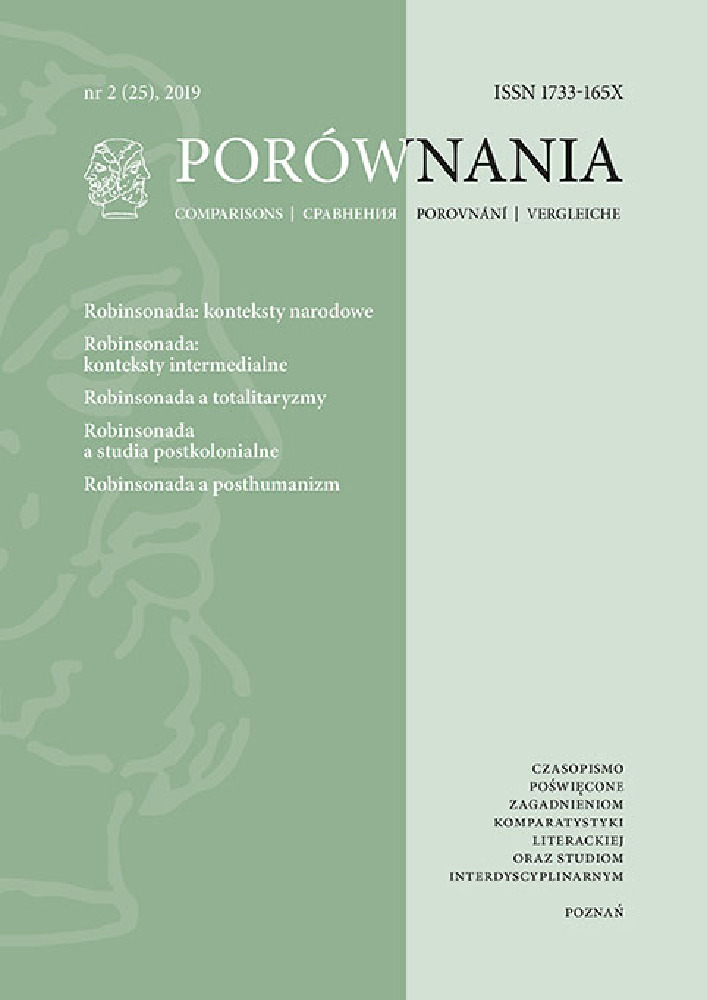Abstract
Starting with Defoe’s famous footprint scene, this contribution focuses on the Martiniquan author Patrick Chamoiseau’s rewriting of Robinson Crusoe L’empreinte à Crusoé (2012). In this polyphonic novel, the footprint becomes an accelerator for individualisation and relation. After discovering the footprint, Chamoiseau’s Robinson, a black amnesic African, is obsessed by the possible presence of another. He puts into question his identity and enters into a new relation with the whole island, its flora and fauna. The novel might be seen as a poetical transformation of Chamoiseau’s theoretical and poetological ideas on creolization which are developed in the manifesto of the creoleness movement In Praise of Creoleness. The footprint thus becomes a symbol for the creolization processes.
References
Bachtin, Michail. “Das Wort im Roman”. Die Ästhetik des Wortes. Aus dem Russischen übersetzt von Rainer Grübel und Sabine Reese. Red. R. Grübel. Frankfurt: Suhrkamp, 1979 [1934/35]. S. 154-301.
Bataillé Mathilde, Charrier Blandine. “Le Mythe de Robinson Crusoé à l’épreuve du monde global: Il n’y a pas d’ailleurs. Étude du motif de l’empreinte dans L’Empreinte à Crusoé de Patrick Chamoiseau”. Revue Critique de Fixxion Française Contemporaine/Critical Review of Contemporary French Fixxion 16 (2018). S. 120-129.
Bernabé Jean, Chamoiseau Patrick, Confiant Raphaël. Éloge de la Créolité. Édition bilingue français/anglais. Texte traduit par M. B. Taleb-Khyar. Paris: Gallimard, 1999 [1989].
Chamoiseau, Patrick. Écrire en pays dominé. Paris: Gallimard, 1997.
Chamoiseau, Patrick. L’empreinte à Crusoé. Paris: Gallimard, 2012.
Chamoiseau, Patrick. Die Spur des Anderen. Roman nach Robinson Crusoe. Aus dem Französischen von Beate Thill. Heidelberg: Wunderhorn, 2014.
Chamoiseau, Patrick. “Interview mit François Busnel”. 2012. Web 31.10.2019 https://www.franceinter.fr/emissions/le-grand-entretien/le-grand-entretien-31-mai-2012
Constant, Isabelle. Le Robinson antillais. Paris: L’Harmattan, 2015.
Corcoran, Patrick. The Cambridge Introduction to Francophone Literature. Cambridge: Cambridge University Press, 2007.
Defoe, Daniel. Robinson Crusoe. Oxford: Oxford University Press, 1999 [1719].
Deleuze, Gilles. “Causes et raisons des îles désertes”. L’Ile déserte et autres textes (1953-1974). Red. David Lapoujade. Paris: Minuit, 2002. S. 11-17.
Deleuze, Gilles. “Ursachen und Gründe der einsamen Insel”. Die einsame Insel. Texte und Gespräche 1953-1974. Red. David Lapoujade. Aus dem Französischen von Eva Moldenhauer. Frankfurt: Suhrkamp, 2003 [2002]. S. 10-17.
Derrida, Jacques. The Beast & the Sovereign. Volume II. Red. Michel Lisse, Marie-Louise Mallet, and Ginette Michaud. Translated by Geoffrey Bennington. Chicago and London: The University of Chicago Press, 2011.
Genette, Gérard. Palimpsestes. La littérature au second degré. Paris: Seuil, 1982.
Glissant, Édouard. Kultur und Identität. Ansätze zu einer Poetik der Vielheit. Aus dem Französischen von Beate Thill. Heidelberg: Wunderhorn, 2005 [1996].
Glissant, Édouard. Introduction à une poétique du divers. 2. Auflage. Paris: Gallimard, 2006 [1996].
Glissant Édouard, Chamoiseau Patrick. Quand les murs tombent. L’identité nationale hors-la-loi? Paris: Galaade, 2007.
Graziadei, Daniel. “Nissopoiesis: Wie Robinsone ihre Inseln erzählen”. Handbuch Literatur & Raum. Red. J. Dünne, A. Mahler. Berlin/Boston: de Gruyter, 2015. S. 421-430.
Griaule, Marcel. Dieu d’eau. Entretiens avec Ogotemmêli. Paris: Éditions du Chêne, 1948.
Jung, Carl Gustav. “Die Beziehungen zwischen dem Ich und dem Unbewussten“. Persönlichkeit und Übertragung. Grundwerk C. G. Jung. Red. H. Barz, U. Baumgardt, R. Blomeyer, H. Dieckmann, H. Remmler, T. Seifert. Band 3.
Olten: Walter, 1984 [1928]. S. 9-124.
Lüsebrink, Hans-Jürgen. “Postkoloniale Perspektivierungen: Zur Neu-Lektüre europäischer Klassiker bei Autoren aus Antike und der Karibik”. Klassiker. Neu-Lektüren. Red. R. Bogner, M. Leber. Saarbrücken: Universitätsverlag
des Saarlandes, 2013. S. 229-241.
Masłowski, Damian. “L’Empreinte à Crusoé de Patrick Chamoiseau – Le Retour symbolique au précolonialisme”. Études Romanes de Brno 38 (2017). S. 101-112.
Osthues, Juilan. “Rewriting”. Handbuch Postkolonialismus und Literatur. Red. D. Göttsche, A. Dunker, G. Dürbeck. Stuttgart: Metzler, 2017.
Pigeard de Gurbert, Guillaume. Contre la philosophie. Paris: Actes sud, 2010.
Tournier, Michel. Vendredi ou les limbes du Pacifique. Paris: Gallimard, 1982 [1967].
License
Utwory opublikowane w czasopiśmie „Porównania”, na platformie Pressto należącej do Uniwersytetu im. Adama Mickiewicza w Poznaniu są udostępniane na licencji Creative Commons Uznanie autorstwa - Bez utworów zależnych 4.0 Międzynarodowe (CC BY-ND 4.0)
Tym samym wszyscy zainteresowani są uprawnieni do korzystania z utworów opublikowanych pod następującymi warunkami:
-
uznania autorstwa — czyli obowiązek podania wraz z rozpowszechnianym utworem informacji o autorstwie, tytule, źródle (odnośniki do oryginalnego utworu, doi) oraz samej licencji
-
bez utworów zależnych — remiksując, przetwarzając lub tworząc na podstawie utworu, nie wolno rozpowszechniać zmodyfikowanych treści.
-
brak dodatkowych ograniczeń — nie można korzystać ze środków prawnych lub technologicznych, które ograniczają innych w korzystaniu z utworu na warunkach określonych w licencji.
Uniwersytet im. Adama Mickiewicza w Poznaniu zachowuje prawo do czasopisma jako całości (układ, forma graficzna, tytuł, projekt okładki, logo itp.).
Autor zachowuje prawa majątkowe, ale udziela zgody Uniwersytetowi im. Adama Mickiewicza w Poznaniu na wykorzystanie dzieła. Autorzy tekstów zakwalifikowanych do publikacji proszeni są o wypełnienie podpisanie i przesłanie umowa (PL) agreement (EN)
Agreement for granting a royalty-free license to works with a commitment to grant a CC sub-license




